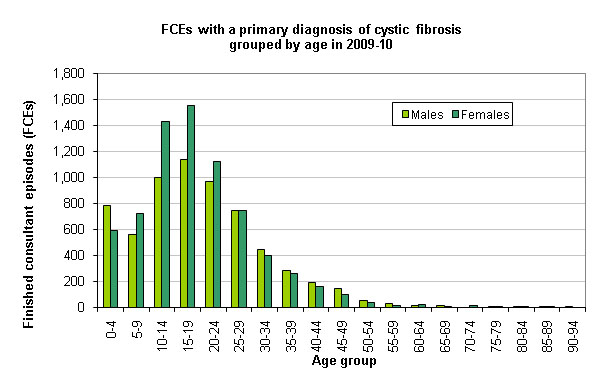IN THIS SITE...

- NHS Choices: Cystic fibrosis
- Cystic Fibrosis Trust
- Inpatient data
- Self service
HES on... Cystic fibrosis
This article gives an overview of the disease and highlights related HES 2009-10 data.
What is cystic fibrosis?
According to NHS Choices, cystic fibrosis is a common inherited disease that affects the internal organs, especially the lungs and digestive system. It is caused by a faulty gene that controls the movement of salt and water in and out of cells in the body. When a person has cystic fibrosis, too much salt and not enough water passes into their cells. This turns their body's secretions, which normally act as a lubricant, into thick mucus that blocks up many of the body's tubes, ducts and passageways. This means that those tubes, ducts and passageways are not able to work properly and, in the lungs, this can lead to frequent and severe infections.
Who does it affect?
In the UK, five babies are born with the condition every week. The faulty gene that causes cystic fibrosis is recessive, which means you need two faulty genes - one from each parent - to inherit the disease. Around 1 in 25 people in the UK are carriers of the cystic fibrosis gene. These people do not have the disease but their children may inherit it.
 |
HES data on Cystic Fibrosis (ICD-10 - E84) shows that in 2009-10:
- there were 13,507 finished consultant episodes (FCEs) with a primary diagnosis of cystic fibrosis, which shows a 70% increase from 2000-2001 when there were 7,934 FCEs.
- those aged between 10 and 19 are the most likely to be treated in hospital for cystic fibrosis, representing 38% of all cystic fibrosis FCEs. There is a higher proportion of females being treated in this age group (58%).
- the average waiting time for admissions to hospital for cystic fibrosis is around 45 days, with an average length of stay of 9.1 days.
- cystic fibrosis accounted for 78,638 FCE bed days.
More information on this topic is available from NHS Choices here.

